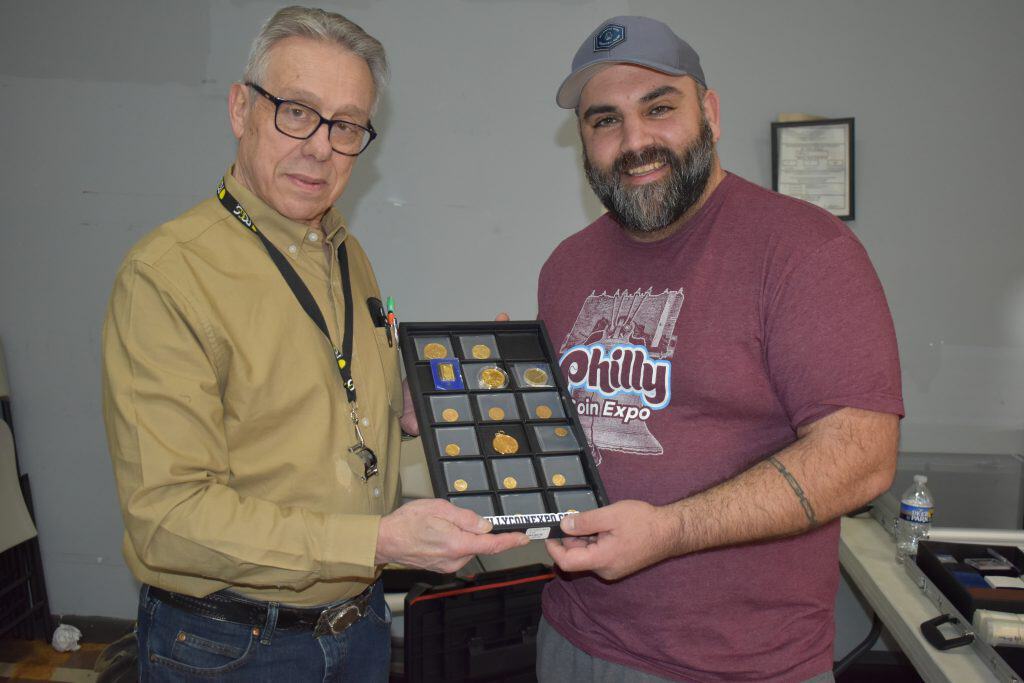
World War II was raging across Europe and the Pacific islands in 1943, and copper was a limited resource needed for military equipment.
To help out, the U.S. Mint decided to make pennies out of steel – with a zinc coating – instead of with copper. But a few copper cents have yet to be found.
“Coin experts speculate that they were struck by accident when copper–alloy, 1–cent blanks remained in the press hopper when production began on the new steel pennies,” says the American Numismatic Association (ANA).
“The government was saving copper for the war effort,” explained Tom Gullone as he oversaw the South Jersey Coins & Collectibles Show at the Lindenwold Moose Lodge on Feb. 4. “The Philadelphia, Denver and San Francisco mints each printed 12 to 15 copper pennies. There were 40 struck all together, and we know where 20 of them are.
“There are 20 more out there.”
Gullone noted that the last copper penny, found in 2015, was sold at auction for $1.4 million. A 1943 copper cent was first offered for sale in 1958, bringing more than $40,000. A subsequent piece sold for $10,000 at an ANA convention in 1981. Then in 1996, yet another went for $82,500. The price has kept increasing since.
“What’s in your pockets?” is the favorite saying of Gullone, who started collecting coins at the young age of 7 while growing up in the North Jersey town of Fairlawn.
“I bought those coin albums and started collecting nickels, dimes and quarters,” he recalled. “I still have them all.”
There were huge volumes of Lincoln pennies struck in Philadelphia in 1983 as the copper versions were being discontinued and steel coins were taking their place, according to Gullone. At the time, there were still 1982 copper blanks in the hopper.
“Save all of your 1983 pennies,” Gullone advised. “They may be valuable. A copper penny in 1982 weighed 3.1 grams, while a 1983 zinc penny weighed 2.5 grams,”
Coin collector Mike Demling and Gullone said other valuable coins were often the result of a mistake, such as a double die when it is stamped twice or an off-center strike. Demling noted that people have been collecting coins for centuries, and he owns one of the first coins ever made called a stater – “a little clump of electrum and gold used by the Greeks in 650 BCE (Before Common Era).”
It was an electrum turtle coin struck at Aegina and the stater had a mark of authority with pictures or words.
New Jersey minted its own coins from 1786 through 1788.
“It was called the New Jersey cent and a lot of them are still being dug up today,” Gullone pointed out.
“I’m interested in keeping the hobby of coin collecting growing among young people,” he said, adding that the next show at the Lindenwold Moose Lodge is scheduled for Sunday, March 3, from 9 a.m. to 3 p.m. For information go to southjerseycoinshow.com.
Vendor Nick Campione of Philadelphia proudly displayed his tray of valuable gold coins at the Feb. 4 show.
“I love Lindenwold,” he remarked. “It’s a great show. It is fun for the family and it’s nice to meet new people.”
Campione is organizing the upcoming Philadelphia Coin Expo Friday through Sunday, May 10 and 11, in Oaks, Pennsylvania. For information, go to phillycoinexpo.com.









